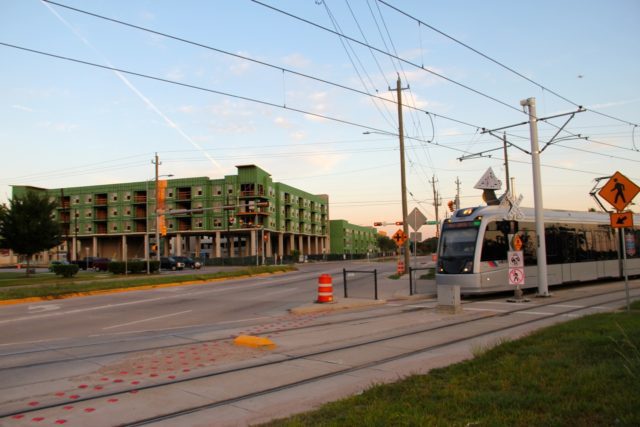It's been about three months since the deluge of Hurricane Harvey inflicted an estimated $200 billion in damage on the Houston region. The recovery is just beginning.
Billions in federal support will be flowing into the city. Texas Governor Greg Abbott recently requested $61 billion in relief in addition to what's expected to come from FEMA and HUD, reports Rice University's Raj Mankad at OffCite. About a third of that $61 billion would be spent on housing.
The recovery effort should help ensure that Houston will be better prepared to deal with future extreme weather events, says Mankad, and that includes directing housing resources toward transit-accessible locations:
“The post-Harvey disaster recovery could be a huge turning point that sets a positive course for the city,” says Tom McCasland, Director of the City of Houston’s Housing and Community Development Department. “The city can encourage multi-family housing where there is good transit, with service that is every 15 minutes during peak hours, and that is 100 percent affordable or has a mix [of affordable, workforce, and market-rate housing].”
McCasland’s emphasis on equitable transit-oriented development, or eTOD for policy geeks, would bring Houston in line with a national push for community development that considers housing and transportation costs together when measuring affordability. Houstonians on average spend 45 percent of our income on housing and transportation together according to a Center for Neighborhood Technology report. Houston could achieve a more affordable future by lining up housing investments and METRO’s current services, and its capital planning.
An estimated 300,000 cars flooded during Harvey. For many, the disaster is not being able to get to work. So eTOD would address poverty, mobility, air pollution, housing costs, and flood resilience.
There's a precedent in Houston for this approach. Hurricane Ike in 2008 led to some transit-oriented housing projects, like the Village at Palm Center (under construction in top photo). But housing like that was too slow to come online, says Mankad.
This time Houston will have to figure out how to provide walkable, affordable housing faster, and to do so without causing displacement. It won't be easy, but Mankad says there's "a window for a massive investment in equitable transit-oriented development, and it won’t be open long."
More recommended reading today: The Reno Rambler says the auto industry's holiday ads have a whiff of desperation. And the Omaha Herald reports local leaders are looking at Cincinnati's streetcar troubles as a cautionary tale.






